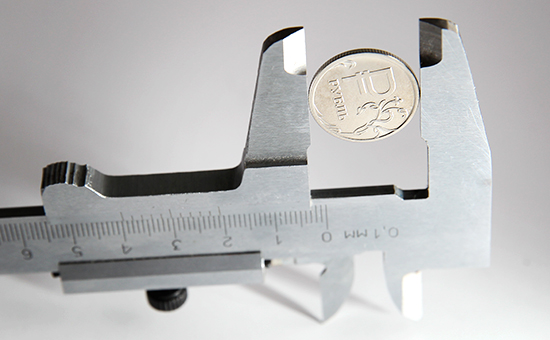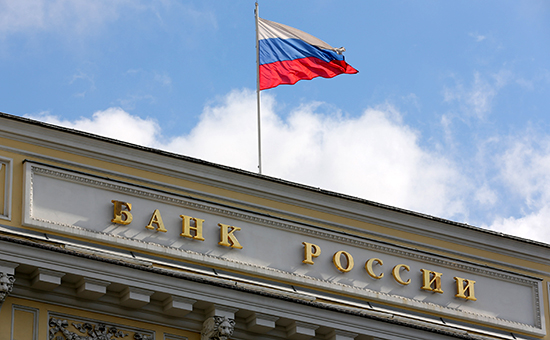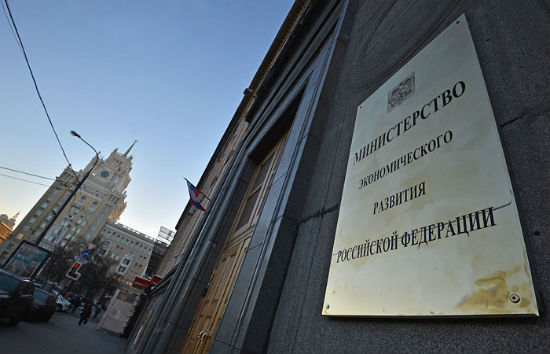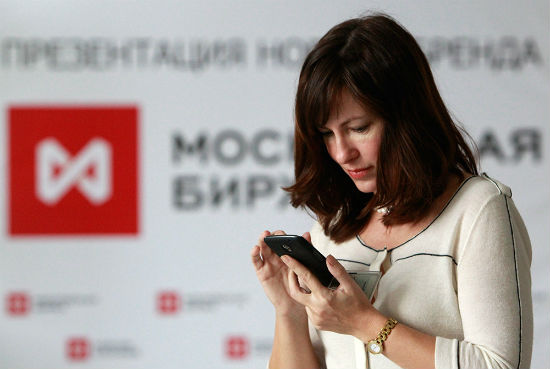What happened in the world of finance in a week # 9
Hi, Geektimes! We continue to publish reports on major events in the world of finance and the stock market.

Photo: Ekaterina Kuzmina / RBC
')
The previous edition of the information digest can be found at this link .
The past week began with the S & P agency’s downgrade of the country's credit rating to “trash” and the subsequent fall of the ruble — in the middle of the week, the euro was trading above 77 rubles, and the dollar exceeded 69 rubles.
On Friday, January 30, the Central Bank announced a reduction in the key rate by 2 percentage points - from 17% to 15% per annum. According to Russian Finance Minister Anton Siluanov, this was done because the authorities managed to slow down the fall of the ruble. The minister said that the ruble exchange rate is now " is equilibrium ." The head of the Central Bank Elvira Nabiullina said that the rate of 15% is sufficient to slow down inflation.

Fotobank / Getty Images
Here's how this decision was commented on by Sergey Egishyants, chief economist of ITinvest, in his weekly review:
Immediately after the announcement of the news about the reduction of the key rate on the stock exchange, there was another jump in the dollar and euro rates - the American currency rose in price to 71.8 rubles. (3 rubles higher than the previous day's close), and the euro - up to 81.55 rubles. (3,875 rubles higher than the previous day’s closing level).
Such movements did not embarrass the authorities - First Deputy Prime Minister Igor Shuvalov advised Russians to get used to the unstable exchange rate of the ruble (earlier at a forum in Davos, he stated that the current crisis would be more serious than in 2008). In support of this, the Ministry of Economic Development and Trade voiced a forecast on the level of the fall of the Russian economy - according to experts of the department, the decline will be 3%.

Photo: News.Mail.ru
The new week began on the stock exchange with a fall in the ruble exchange rate - and the dollar and the euro took levels higher than the close on Friday. Even the news about increased oil prices did not help the Russian currency: Brent for most of the last week was trading at $ 48-49 per barrel, but during the last January trading, the price rose sharply, exceeding $ 53 per barrel at the maximum. On Monday, ICE futures prices for March delivery fluctuated between $ 51 and $ 52 a barrel.
Sergey Egishyants described the situation on the oil market as follows:
According to Bloomberg analysts, the ruble, quite possibly, has not yet reached the bottom and may continue to fall.
The start of last week in the Russian stock market was in a negative way. The MICEX ruble index lost within 2%, and the RTS currency index sank by almost 4%.

Photo: Sergey Karpukhin / Reuters
ITinvest expert Vasyl Oleinik named among the reasons for investors' concern the aggravation of the situation in Ukraine and the growth of geopolitical risks:
A week, however, the main Russian stock indices closed multidirectionally - MICEX added 0.5% and amounted to 1,647.69 points, the RTS index fell 1.4% to 737.35 points.
Forecasts for 2015
RBC-TV economic observer Zhanna Nemtsova discussed with the head of investor relations at Severstal PJSC, Vladimir Zaluzhsky, the situation in the markets of metallurgists and exporters, the new cycle in the commodity market and forecasts of its development, as well as the possibility of buying Eurobonds, including for a wide range Investors on the Moscow Exchange
That's all, thank you for your attention. More analytical materials from leading experts on the ITinvest website .
PS If you notice a typo, a broken link or other inaccuracy - write us a personal message and we will fix everything promptly.
PPS We already wrote that on the St. Petersburg Stock Exchange there was an opportunity to buy stocks of foreign companies (Google, Facebook, more recently Alibaba , etc.). An online conference will be held tomorrow (February 3), during which representatives of the Exchange and ITinvest will answer all questions on this topic. The broadcast will be available on the site by reference .

Photo: Ekaterina Kuzmina / RBC
')
The previous edition of the information digest can be found at this link .
Currency markets
The past week began with the S & P agency’s downgrade of the country's credit rating to “trash” and the subsequent fall of the ruble — in the middle of the week, the euro was trading above 77 rubles, and the dollar exceeded 69 rubles.
On Friday, January 30, the Central Bank announced a reduction in the key rate by 2 percentage points - from 17% to 15% per annum. According to Russian Finance Minister Anton Siluanov, this was done because the authorities managed to slow down the fall of the ruble. The minister said that the ruble exchange rate is now " is equilibrium ." The head of the Central Bank Elvira Nabiullina said that the rate of 15% is sufficient to slow down inflation.

Fotobank / Getty Images
Here's how this decision was commented on by Sergey Egishyants, chief economist of ITinvest, in his weekly review:
The Bank of Russia suddenly reduced its key rate by 2% to 15% - the explanation is that inflation will fall due to weak demand and a growing credit collapse. It is logical, but after all, this state of affairs was also in December - but the percentage was then thrown upwards: it was raised not because of prices, but because of the ruble - meanwhile, the latter does not grow, to put it mildly. Want to help the real sector? - but for him that 15%, that 17%, in general, about the same thing: the beyond. Therefore, it is not easy to understand the logic of the Central Bank - therefore the market is frightened: in October-December, he saw the confusion of the authorities turning into panic (that is why the ruble was torn off the roof on December 16) - recently everything seemed to calm down, but now a new strange decision has come.
Immediately after the announcement of the news about the reduction of the key rate on the stock exchange, there was another jump in the dollar and euro rates - the American currency rose in price to 71.8 rubles. (3 rubles higher than the previous day's close), and the euro - up to 81.55 rubles. (3,875 rubles higher than the previous day’s closing level).
Such movements did not embarrass the authorities - First Deputy Prime Minister Igor Shuvalov advised Russians to get used to the unstable exchange rate of the ruble (earlier at a forum in Davos, he stated that the current crisis would be more serious than in 2008). In support of this, the Ministry of Economic Development and Trade voiced a forecast on the level of the fall of the Russian economy - according to experts of the department, the decline will be 3%.

Photo: News.Mail.ru
The new week began on the stock exchange with a fall in the ruble exchange rate - and the dollar and the euro took levels higher than the close on Friday. Even the news about increased oil prices did not help the Russian currency: Brent for most of the last week was trading at $ 48-49 per barrel, but during the last January trading, the price rose sharply, exceeding $ 53 per barrel at the maximum. On Monday, ICE futures prices for March delivery fluctuated between $ 51 and $ 52 a barrel.
Sergey Egishyants described the situation on the oil market as follows:
Oil and gas continued to stand at the bottom, despite the widespread decline of wells in the United States and the complaints of OPEC secretary general Al-Badri, they say, if everyone now stops investing because of cheapness, then after a couple of years the price can soar up to 200 bucks per barrel; At the same time, the head of Goldman Sachs Kohn (the oil trader himself in the past) promises 30 soon. It seems to us that the bottoms will be there until the end of the first quarter - after which a rather vigorous rebound will take place: how vigorous it depends on the resulting minimums - let's wait a bit although it may not be necessary to wait, because under the closing of the month oil rose vertically.
According to Bloomberg analysts, the ruble, quite possibly, has not yet reached the bottom and may continue to fall.
Stock markets
The start of last week in the Russian stock market was in a negative way. The MICEX ruble index lost within 2%, and the RTS currency index sank by almost 4%.

Photo: Sergey Karpukhin / Reuters
ITinvest expert Vasyl Oleinik named among the reasons for investors' concern the aggravation of the situation in Ukraine and the growth of geopolitical risks:
[...] The conclusion is that February will not be the best month for investors, so it’s clearly not to hurry now with long-term purchases.
A week, however, the main Russian stock indices closed multidirectionally - MICEX added 0.5% and amounted to 1,647.69 points, the RTS index fell 1.4% to 737.35 points.
Forecasts for 2015
RBC-TV economic observer Zhanna Nemtsova discussed with the head of investor relations at Severstal PJSC, Vladimir Zaluzhsky, the situation in the markets of metallurgists and exporters, the new cycle in the commodity market and forecasts of its development, as well as the possibility of buying Eurobonds, including for a wide range Investors on the Moscow Exchange
That's all, thank you for your attention. More analytical materials from leading experts on the ITinvest website .
PS If you notice a typo, a broken link or other inaccuracy - write us a personal message and we will fix everything promptly.
PPS We already wrote that on the St. Petersburg Stock Exchange there was an opportunity to buy stocks of foreign companies (Google, Facebook, more recently Alibaba , etc.). An online conference will be held tomorrow (February 3), during which representatives of the Exchange and ITinvest will answer all questions on this topic. The broadcast will be available on the site by reference .
Source: https://habr.com/ru/post/376097/
All Articles